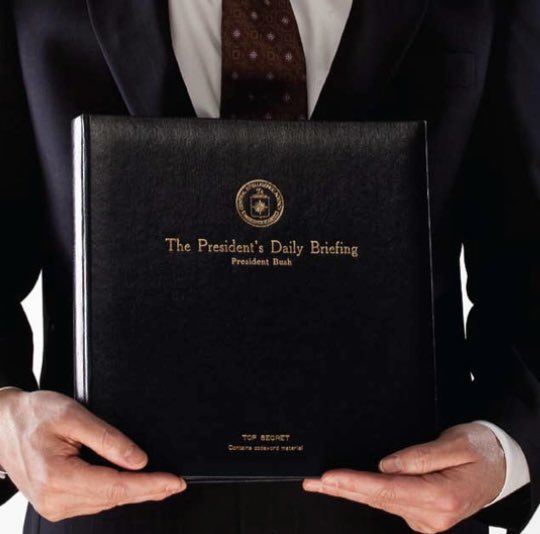THREAD: Speculation has started in earnest about what will happen this year to the tradition of classified intelligence briefings for the major party presidential candidates.
And a lot of what’s being said is wrong, or at least incomplete.
Here’s ground truth —>
1/12
And a lot of what’s being said is wrong, or at least incomplete.
Here’s ground truth —>
1/12
Major-party POTUS candidates have been offered intel briefings during the campaign since 1952.
(Not to be confused with the heavy intel support presidents-elect get—including, since the President’s Daily Brief began in the mid 1960s, a copy of the outgoing POTUS’s PDB.)
2/12
(Not to be confused with the heavy intel support presidents-elect get—including, since the President’s Daily Brief began in the mid 1960s, a copy of the outgoing POTUS’s PDB.)
2/12
The tradition began in 1952, when President Truman—reflecting on his sudden succession to the presidency in April 1945—offered classified briefings to both candidates (Dwight Eisenhower and Adlai Stevenson) seeking to succeed him.
No statute required it. Just a courtesy.
3/12
No statute required it. Just a courtesy.
3/12
Every four years since then, the two major party nominees—and, most of the time, also their VP nominees—have been offered all-source assessments of global hotspots, almost always after the parties’ conventions.
They need not be classified, or offered at all. But they are.
4/12
They need not be classified, or offered at all. But they are.
4/12
Originally, the CIA provided the briefings. Since intelligence community reforms in 2004, the Office of the Director of National Intelligence has managed the process.
And it has worked; the vast majority of candidates have gladly taken one or more pre-election briefings.
5/12
And it has worked; the vast majority of candidates have gladly taken one or more pre-election briefings.
5/12
These sit-down sessions with intelligence professionals stop well short of the President’s Daily Brief (PDB) and other top-tier finished intel products. But even without the PDB, these limited sessions for candidates serve multiple purposes.
6/12
6/12
First, per Truman’s vision, they give the nominees a robust overview of the national security landscape.
Candidates with deep foreign policy experience naturally get less out of these than candidates with scant previous exposure to international affairs.
7/12
Candidates with deep foreign policy experience naturally get less out of these than candidates with scant previous exposure to international affairs.
7/12
Second, they help nominees avoid casually damage to U.S. interests during the campaign.
About his 1976 campaign briefings, President Carter said, “I wanted particularly not to make any inadvertent mistake that would complicate things for President Ford … or later for me.”
8/12
About his 1976 campaign briefings, President Carter said, “I wanted particularly not to make any inadvertent mistake that would complicate things for President Ford … or later for me.”
8/12
Third, these steadfastly neutral, apolitical sessions allow the intelligence community to show to both candidates the objectivity that characterizes its role in the U.S. national security enterprise, regardless of partisan considerations.
9/12
9/12
The CIA’s Center for the Study of Intelligence has published a free-to-all book about this history, updated through 2016 and available here:
10/12 cia.gov/resources/csi/…

10/12 cia.gov/resources/csi/…

It’s a remarkable nonpartisan tradition that’s lasted 70 years.
For more on the challenge it faced and overcame in 2020, you can read my article in @BulwarkOnline about it here:
“Are the Presidential Candidate Intelligence Briefings in Danger?”
11/12
thebulwark.com/are-the-presid…
For more on the challenge it faced and overcame in 2020, you can read my article in @BulwarkOnline about it here:
“Are the Presidential Candidate Intelligence Briefings in Danger?”
11/12
thebulwark.com/are-the-presid…
And to place these sessions in the wider context of briefing classified information to presidents and presidents-elect, check out my book all about the PDB, its recipients, and its producers:
The President’s Book of Secrets.
/end
amazon.com/gp/aw/d/161039…
The President’s Book of Secrets.
/end
amazon.com/gp/aw/d/161039…
• • •
Missing some Tweet in this thread? You can try to
force a refresh













